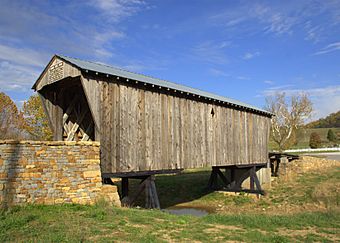Goddard Bridge facts for kids
Quick facts for kids |
|
|
Goddard Bridge
|
|

Goddard Bridge
|
|
| Location | Route 32 at Goddard, Fleming County, Kentucky |
|---|---|
| Built | Early 19th century |
| Architect | Joseph Goddard |
| Architectural style | Town lattice truss |
| NRHP reference No. | 75000756 |
| Added to NRHP | August 22, 1975 |
The Goddard Bridge is a historic covered bridge in Goddard, Kentucky. It stretches about 63 feet (19 meters) across Sand Lick Creek. You can find it near Kentucky 32, about 8 miles south of Flemingsburg. The bridge is surrounded by beautiful scenery, including the Pea Ridge Mountains and an old church.
Contents
Building the Goddard Bridge
How Old Is It?
We don't know the exact year the Goddard Bridge was built. However, it uses a special design from 1820 called the "lattice truss." This design was created by a famous architect named Ithiel Town. Joseph Goddard was the person who built this bridge.
Moving the Bridge
The Goddard Bridge wasn't always in its current spot. It was first built about a mile south of Goddard. In 1933, Highway 32 was being rebuilt. Because of this, the bridge was carefully moved to where it stands today.
Strong and Safe
To make the bridge even stronger, steel braces were added. These braces are placed into the creek bank near the ends of the bridge, called the abutments. The Goddard Bridge is still used regularly today. Cars and trucks weighing less than 4 tons can safely cross it.
Repair Work
In 1968, the bridge was restored to keep it in good condition. During this restoration, some parts were replaced. These included the side coverings, the roof, and some of the wooden pins. These wooden pins, called trunnels, were used instead of nails to hold the bridge together.
Why Build Covered Bridges?
Protecting the Road
In the 1800s, many covered bridges were built in Kentucky. One reason was to keep the road surface inside the bridge dry. This also helped to keep snow off the road in winter, making it easier to cross.
Protecting the Wood
The most important reason for covering bridges was to protect the wood. Wood can rot and wear out quickly when it's exposed to rain, sun, and snow. The cover helped the wooden parts of the bridge to dry properly and kept water out of the joints. This protection made covered bridges last much longer. They could last seven to eight times longer than bridges without a cover!
 | John T. Biggers |
 | Thomas Blackshear |
 | Mark Bradford |
 | Beverly Buchanan |



